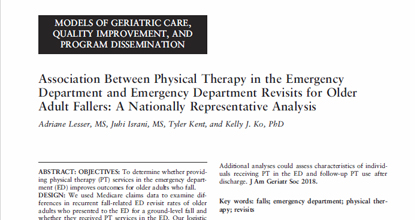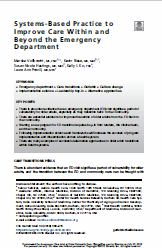
Association Between Physical Therapy in the Emergency Department and Emergency Department Revisits for Older Adult Fallers: A Nationally Representative Analysis
We used Medicare claims data to examine differences in recurrent fall‐related ED revisit rates of older adults who presented to the ED for a ground‐level fall and whether they received PT services in the ED. Our logistic regression model controlled for age, sex, Medicaid eligibility, acute injury, and certain known chronic comorbidities associated with risk of falling.






